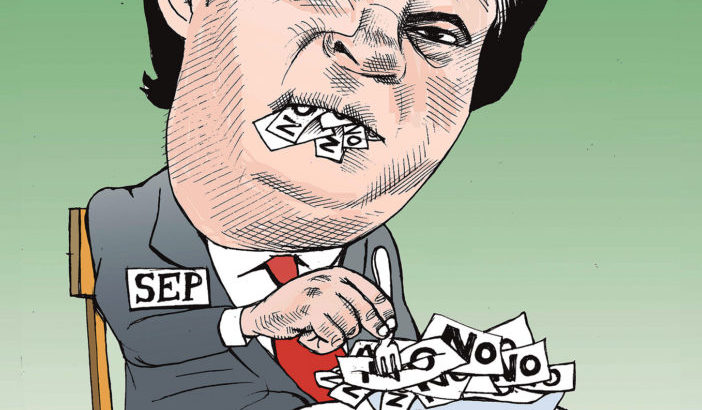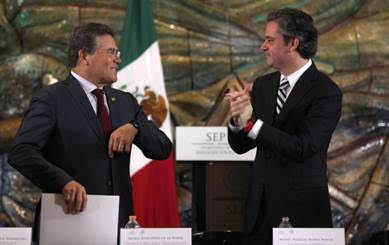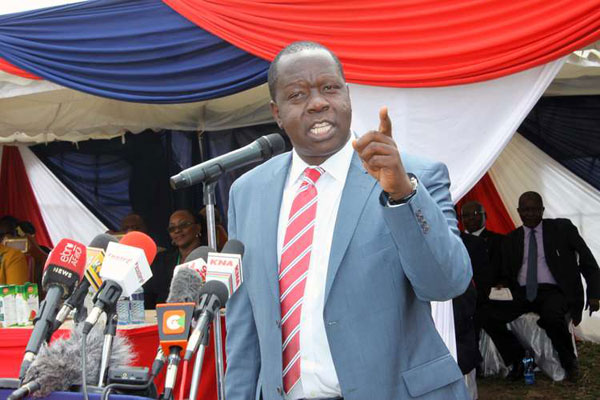Ernesto Villanueva
En unas semanas la polémica de la reforma educativa ha ido en aumento. Atrás quedó la postura del gobierno de Enrique Peña Nieto de que no habría ningún cambio porque “el estado de derecho no se negocia”. Por favor, no hay en México siquiera estado de derecho, pero las islas de derecho sí se están negociando.
Prueba de ello es la negociación que acaba de hacer el secretario de Educación, Nuño, con el SNTE en un galimatías digno de Cantinflas para explicarlo: la reforma educativa sigue, pero se revisarán los criterios de evaluación, los salarios descontados, y se “revisará” el propósito de la evaluación; es decir, si será o no definitiva para la permanencia en el empleo de los maestros. Si eso no es negociar la ley, ¿cómo podría llamarse entonces?
La CNTE, en cambio, es atendida en la Secretaría de Gobernación para los mismos propósitos que el SNTE, agregando la liberación de sus líderes, cuya detención tuvo una clara intencionalidad política de causar parálisis y miedo en las bases de la coordinadora. Esa decisión, empero, lejos de dispersar a las bases, las unió y las enardeció.
Tratar rápida y ventajosamente al SNTE –el sindicato bien portado y aliado– y negar lo mismo a la CNTE genera discriminación, contraria a la Constitución y a la Convención Americana de Derechos Humanos. ¿Dónde quedó el derecho humano a la igualdad, reconocido por el artículo primero constitucional?
El movimiento de la CNTE ya ha ganado algo: romper el discurso inamovible sobre la reforma de la reforma educativa. Ya los legisladores del PRI han dicho que “quizá” no haya sido la mejor. El presidente Peña Nieto afirma que el tema de la reforma de la reforma está en la cancha del Congreso de la Unión y eventualmente en lo que se denomina el poder reformador de la Constitución, por si es necesario proceder a reformas, adiciones o derogaciones en la Constitución Federal. Se expresa en esos términos Peña Nieto para, si es el caso, que salve, si es posible, algo de la imagen que todavía le queda. Así también el propio Peña Nieto ya ha reconocido que el “límite” en el trato con la CNTE es el diálogo. Eso significa que lo que pasó en Nochixtlán no fue en vano y generó, dentro del lamentabilísimo hecho de pérdida de vidas, una vacuna, al menos provisional, contra la represión del Estado.
En su colaboración en El Universal, Pepe Carreño Carlón, director del Fondo de Cultura Económica y muy cercano a Nuño –o éste a aquél–, lamenta el movimiento de la CNTE y responsabiliza al secretario de Gobernación en un hecho inédito, donde de manera pública un alto funcionario escribe sobre otro alto funcionario en los medios, porque, a su decir, la reforma educativa tenía un gran apoyo popular, “seguida de un corolario favorable a las aspiraciones (presidenciales) del titular de SEP. Sin embargo, la misma adicción presentó luego a la disidencia fatalmente blindada en su impunidad, respaldada por una movilización triunfante en su proyecto de meterle reversa a la reforma (educativa), con el apoyo explícito de López Obrador y el embozado del titular de Gobernación, que habría alentado este nuevo escenario” (cursivas mías. http://www.eluniversal.com.mx/entrada-de-opinion/articulo/jose-carreno-carlon/nacion/2016/07/13/el-futurismo-fase-demencial-del)
Es poco menos que imposible pensar que el secretario de Gobernación haya alentado el actual escenario, pero sí habría que reconocer que, después de su desafortunada frase del ultimátum, hubo un cambio sustancial de actitud para atender un serio problema de la agenda de la discusión pública, que tiene carácter de urgente. Y si se hace, además, por la vía racional del diálogo, dejando de lado, por lo menos por ahora, las tentaciones del autoritarismo, representa un rasgo de tolerancia.
Es importante dejar claro que la movilización de la CNTE –que le ha permitido ser interlocutor con el gobierno federal– no es un acto de impunidad en modo alguno, sino una forma legítima de expresar descontento. Es evidente que si la CNTE no hubiera hecho lo que está haciendo, no sería un interlocutor con la Secretaría de Gobernación. Asimismo es importante hacer notar que tanto a nivel de la Corte Europea de Derechos Humanos como de la Corte Interamericana de Derechos Humanos existe jurisprudencia sobre este tema.
En efecto, el derecho de manifestación encuentra asideros legales en las libertades de expresión y de reunión. Estas movilizaciones, contra lo que piensan los autoritarios del gobierno de Peña Nieto, tienen un gran sustento legal tanto en la experiencia comparada como en la aplicable legalmente al caso mexicano. Por un lado, la Corte Europea de Derechos Humanos ha sostenido que “una manifestación puede causar molestias u ofender a aquellas personas que se oponen a las ideas o reclamos que la manifestación intenta promover. Sin embargo, los manifestantes deben poder manifestarse sin tener miedo de sufrir violencia física por parte de sus opositores; dicho miedo podría disuadir a asociaciones o grupos de personas que tienen ideas o intereses en común para que no expresen sus opiniones sobre cuestiones sumamente controvertidas que afectan a la comunidad”. (Caso Plattform “Arzte fur das Leben” c. Austria, sentencia del 21 de junio de 1988, Serie A, No. 139, párrafo 32).
De igual forma, la Corte Interamericana de Derechos Humanos, cuya jurisprudencia es obligatoria para México, al respecto ha sostenido que “la libertad de expresión se inserta en el orden público primario y radical de la democracia, que no es concebible sin el debate libre y sin que la disidencia tenga pleno derecho de manifestarse”. (Colegiación obligatoria de periodistas. Opinión consultiva 0C/ 5/85 párrafo 69).
La moraleja es clara: Lo que no hagamos como sociedad, nadie va a venir a hacerlo por nosotros. La CNTE ha demostrado que el campo minado preparado por el gobierno federal ni quebró la moral de los maestros ni, menos, se logró la división social a la que apelaba el gobierno de Peña Nieto.
Fuente del articulo: http://www.proceso.com.mx/447814/la-reforma-educativa-en-la-mira
Fuente de la imagen: http://cdn.proceso.com.mx/media/2016/07/rocha-2-702×468.jpg













 Users Today : 20
Users Today : 20 Total Users : 35460323
Total Users : 35460323 Views Today : 25
Views Today : 25 Total views : 3419053
Total views : 3419053